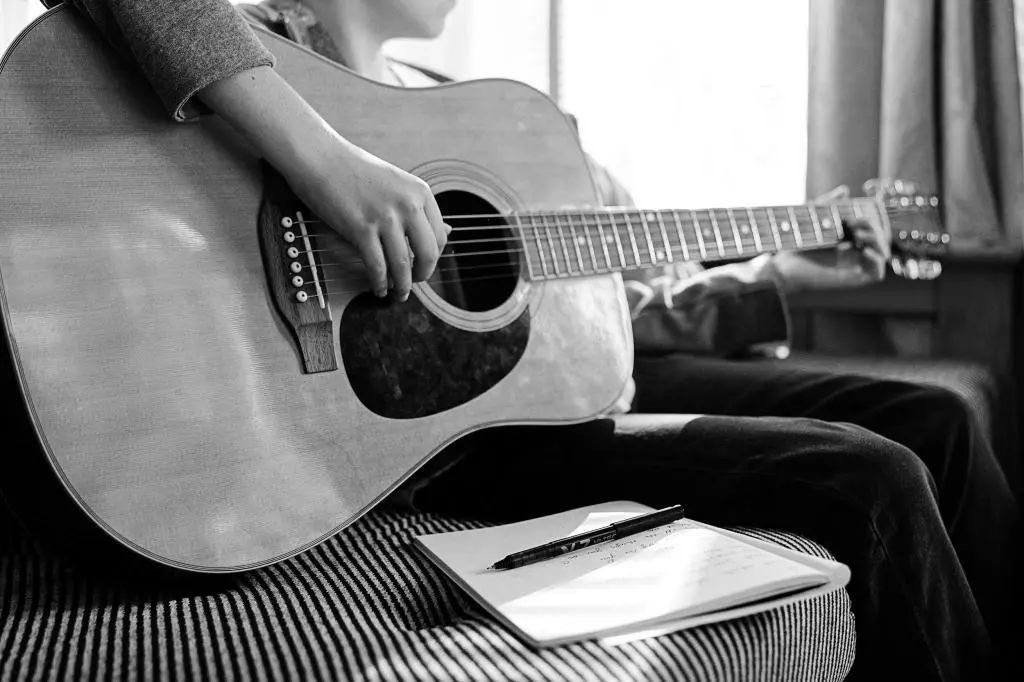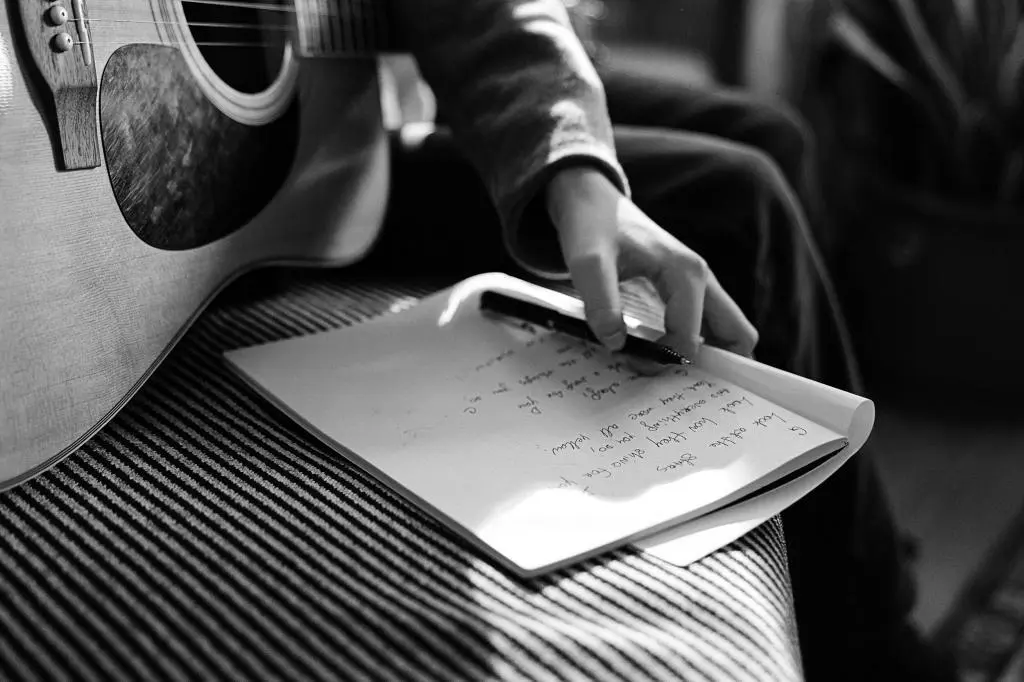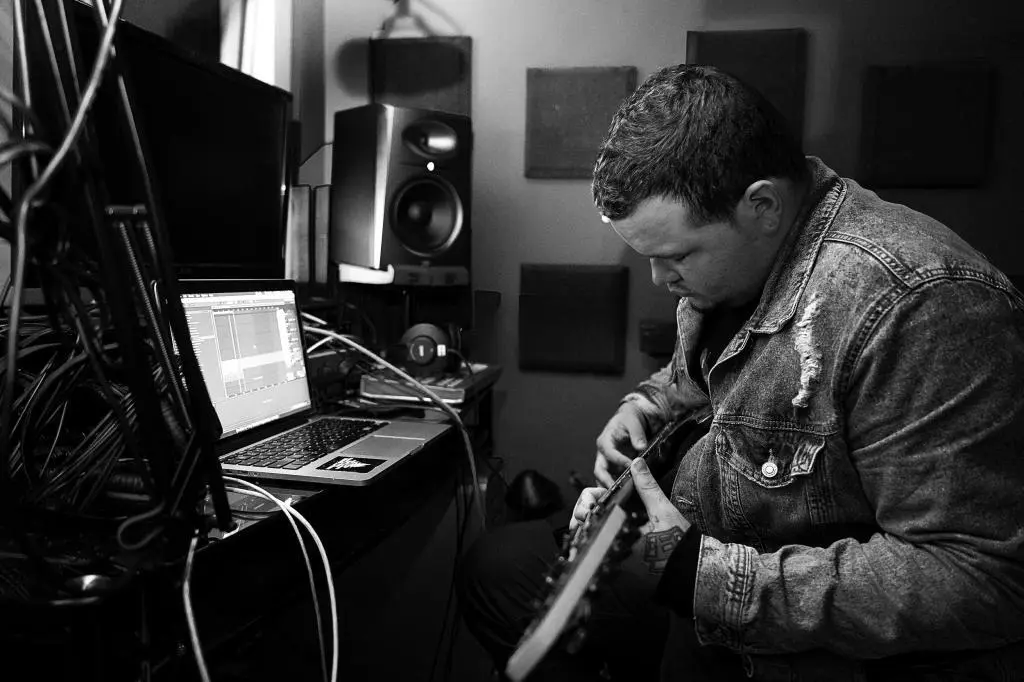If you’ve ever wondered “how to write a song”, you’re embarking on a voyage into a profound craft. Songwriting is not merely the process of generating a harmonious blend of music and lyrics to convey a particular emotion or narrative. It’s an intricate expedition that interweaves emotion with intellect, intuition with structure, and innovation with familiarity.
Picture an artist poised before an untouched canvas, with a plethora of colors and an assortment of brushes at hand. That artist symbolizes the songwriter. The canvas represents silence, the colors denote melodies, chords, and rhythms, and the brushes are the words. The symphony of these elements paints a sonic portrait that triggers a wide array of emotions, sparks thought-provoking ideas, or even provides a comforting companionship in shared human experiences. At its heart, songwriting is an expressive form of storytelling, adroitly interlacing potent melodies with equally compelling lyrics.

How to Write a Song: Table of Contents
Songwriting carves out a unique space within and beyond the musical landscape. Primarily, it serves as a means of communication, a platform for self-expression, and a medium for storytelling. Yet, its impact extends even further. A well-crafted song can touch the deepest corners of a listener’s heart, shift perspectives, and sometimes even contour cultural discourses. Songwriters wield the power to evoke a range of reactions—be it making listeners joyously dance, sob with sorrow, or contemplate life’s enigmas—all through a few minutes of melodic narrative.
The rewards of songwriting are abundant. For some, it’s a therapeutic process, an approach to navigate life’s complexities, cope with emotions, or heal personal afflictions. For others, it’s an exciting creative challenge—the harmonious marriage of lyrics and melody, the hunt for the flawless hook, and the meticulous fine-tuning of every line and note. The mere act of creating, of breathing life into a novel idea with the potential to emotionally connect with people, brings immense joy to numerous songwriters.
Moreover, songwriting can pave the way for a gratifying career, presenting opportunities for collaboration, performance, and even instruction. It may lead to the exhilarating rush of hearing your song play on the radio, witness it resonate with an audience, or provide solace to a listener who feels understood and seen. The rewards, whether personal or professional, tangible or abstract, are varied. However, one aspect remains unequivocally certain: songwriting possesses the ability to enrich lives—the songwriter’s and the listener’s alike.

What Exactly is Songwriting?
Songwriting is an art, a craft, and to some, a science. It’s the process of creating a song, a work of music that’s usually performed by a singer. The components of a song typically include melody (the tune you hum), harmony (the chords that support the melody), rhythm (the beat or pulse), and lyrics (the words). But a song can be more than just these elements—it’s a unique expression of feelings, thoughts, experiences, or ideas, crafted to engage and move an audience.
At its most fundamental level, songwriting involves penning the lyrics or the words of a song, which tell a story or convey a message. It also includes composing the music that accompanies these lyrics, including the melody, rhythm, harmony, and often, arranging the overall structure of the song. It’s a fusion of musical and lyrical skills to create something that’s more than the sum of its parts. The best songs not only sound good but also touch hearts, inspire minds, and often, stand the test of time.

Can Anyone Write a Song?
The answer, quite simply, is yes. Anyone can write a song. It doesn’t require a special qualification, a particular background, or even a musical instrument. All it requires is a willingness to express yourself, an openness to learning, and the patience to practice.
Just like any other skill, songwriting improves with time and effort. It’s true that some individuals may have a natural affinity for it – they might have a good ear for melody or a knack for rhyming words. However, the core skills of songwriting can be learned, honed, and mastered over time. Everyone has stories to tell, emotions to share, and ideas to express. Songwriting is just another medium to do that. The key is to start, to try, to experiment, and to keep going, even if your first attempts don’t meet your expectations.
Is Writing a Song Hard?
Writing a song can indeed be challenging, but it’s a challenge that can be embraced and overcome. It’s not just about putting words on a page and setting them to music. It’s about capturing an emotion, conveying a message, or telling a story in a way that resonates with listeners. It’s about creating something original, memorable, and impactful. That’s no small feat, and it’s what makes songwriting both difficult and rewarding.
The challenge lies not only in the creation of a song but also in the refining and editing process. Songwriting often involves revising and tweaking until every word, every note, and every pause feels right. It involves making choices about what to say and how to say it, what to include and what to leave out.
However, while writing a song can be hard, it’s also incredibly fulfilling. The joy of creating, the thrill of seeing a song come together, the satisfaction of knowing you’ve created something that might touch someone else’s life – these make all the challenges worth it. And remember, every songwriter, even the most successful ones, started somewhere. The key is to keep writing, keep learning, and keep improving.

How do I start Writing Music? How to Write a Song?
Starting to write your own music might seem like a colossal task. The blank page, or silence in musical terms, can be intimidating. But the process becomes less daunting when you break it down into manageable steps.
Here’s a simple guide on how to get started with writing music:
- Listen and Learn: Start by listening to a wide range of music. Try to understand the various components that make up a song—the melody, the harmony, the rhythm, the lyrics. Pay attention to how these elements interact, how they create tension and resolution, how they communicate emotion.
- Explore the Basics: Familiarize yourself with the basics of music theory. Learn about scales, chords, and chord progressions. Understand how rhythm works. This foundational knowledge will give you the tools you need to start composing your own music.
- Start Simple: You don’t need to write a full-length song right away. Start with a simple melody or a chord progression. Experiment with different rhythms.
- Express Yourself: Try to put your thoughts and feelings into your music. Maybe you want to express joy, sadness, anticipation, or nostalgia. Use the tools of melody, harmony, and rhythm to convey these emotions in your music.
- Iterate and Refine: Don’t worry if your first attempts aren’t perfect. Writing music is a process of trial and error, of experimenting and refining. Be patient with yourself, and keep trying until you’re satisfied with your creation.
What Should I Start a Song With?
There’s no definitive answer to this question because every songwriter has a unique process. Some songwriters start with a melody, crafting a tune that’s catchy and emotive. Others start with a chord progression, building a harmonic framework for their song. Some start with the lyrics, penning a poem or a story that they then set to music. And some start with a concept or a title, letting that guide their musical and lyrical choices.
What’s most important is that you start with something that inspires you—be it a melodic hook, a lyrical phrase, a chord progression, or an emotional concept. It’s this initial spark that will fuel your creative process, and it’s this spark that you’ll develop and shape into a full-fledged song.
Why is Inspiration crucial in Songwriting?
Inspiration plays a vital role in songwriting. It’s the spark that sets the creative process in motion. It can come from anywhere—a personal experience, a story you’ve heard, a scene you’ve observed, a feeling you’ve had, a phrase you’ve read, a melody you’ve hummed. It can be momentous like a life-changing event, or everyday like a morning coffee routine.
Inspiration is crucial because it provides the raw material for your song. It gives you a theme to explore, a message to convey, an emotion to express. It helps you find a unique angle or a fresh approach. It imbues your song with authenticity and depth, making it resonate with listeners on a personal level.
However, inspiration is only the starting point. It’s the spark that lights the fire, but it’s your job as a songwriter to keep that fire burning. This requires skill, craft, and dedication. It involves shaping and refining your initial inspiration into a song that’s engaging, coherent, and impactful. It’s a process that’s as challenging as it is rewarding, and it’s what makes songwriting such a fascinating journey.

How to Write a Song: Creating Melodies
A melody is the soul of a song. It’s the tuneful thread that weaves through the song, bringing unity to its various components. It’s the element that listeners often latch onto first and remember most. A catchy, emotive melody can make a song unforgettable, turning it into a hum-on-repeat anthem that resonates with listeners long after they’ve heard it.
Melodies give songs their individual identity, setting them apart in a vast sea of music. They carry the emotion of a song, conveying feelings in a way that words alone often can’t. A soaring melody can express joy and triumph, a minor melody can communicate sadness and melancholy, a fast-paced melody can convey excitement and anticipation.
Moreover, melodies play a crucial role in structuring a song. They help shape the song’s contour, its peaks and valleys, its tension and resolution. They interact with the song’s lyrics, rhythm, and harmony, creating a cohesive musical narrative.
In short, melody is an indispensable aspect of songwriting. It’s the heart that pumps life into a song, making it pulse with emotion, rhythm, and identity.
How to Write a Song: Techniques for Creating Captivating Melodies
Creating a captivating melody is both an art and a science. It involves intuition and emotion, but also understanding of musical principles and techniques.
Here are a few strategies to help you craft engaging melodies:
- Start with a Motif: A motif is a short musical idea, a seed from which you can grow your melody. It can be as simple as a few notes or a rhythmic pattern. The key is to take this motif and develop it throughout your song, varying it, repeating it, expanding it, condensing it. This gives your melody unity and coherence.
- Use Stepwise Motion: Melodies that move mainly by step (from one note to the note directly above or below) tend to be easy to sing and remember. While leaps can add interest and drama, too many can make a melody disjointed and hard to follow.
- Create Contrast: Use contrast to keep your melody engaging. This can be contrast between high and low notes, between long and short notes, between fast and slow rhythms, between tension and resolution.
- Follow the Chords: Your melody should generally fit with the underlying chord progression. This doesn’t mean it has to mimic the chords exactly, but it should at least outline or imply them.
- Keep It Singable: Remember that melodies are often sung. Therefore, they should be singable. This means they should have a manageable range, a sensible rhythm, and a clear contour.
- Iterate and Refine: Once you have a rough version of your melody, play it over and over. Sing it, hum it, whistle it. See if it sticks in your mind. Adjust any parts that feel awkward or uninspiring.
Creating captivating melodies takes practice. Don’t be discouraged if your initial attempts don’t turn out as you’d like. Keep experimenting, keep learning, and with time, you’ll see your melodic crafting skills improve.
How to Write a Song: Writing Lyrics and Creating Structure
Writing song lyrics is a unique form of expression, one that combines the power of language with the emotive force of music. Here’s how you can approach it:
Begin with a concept or a theme: What message or story do you want your song to convey? What emotions do you want it to evoke? Your theme could be anything from love and heartbreak to social issues, personal experiences, or even a fictional narrative. Having a clear concept can guide your lyric writing and give your song a cohesive, resonant message.
Craft your song’s title: A good title can spark curiosity and draw listeners in. It often encapsulates the song’s main theme and is typically the hook or the focal point of the song.
Pen down initial ideas or phrases: These could stem from your emotions, thoughts, observations, experiences, or imagination. Don’t filter anything at this stage; just let your thoughts flow onto the paper (or screen).
Develop your lyrics: Now, take your rough ideas and start to flesh them out. Consider how you can use imagery, metaphor, and other literary devices to convey your message in a unique, evocative way.
Revise and refine: Once you have a draft of your lyrics, go through them again. Cut out unnecessary words, ensure each line contributes to the overall narrative, and make sure the words flow well both rhythmically and melodically.
How to Write a Song: How to Structure Your Song Effectively?
Song structure refers to how a song is organized, using various sections such as verses, choruses, bridges, intros, and outros. While there’s room for creativity and experimentation, most songs in popular music follow a common structure: Verse – Chorus – Verse – Chorus – Bridge – Chorus (also known as VCVCBC).
Here’s a brief rundown on how to use each section:
- Verses: Verses tell your song’s story, giving details and progressing the narrative. Each verse usually has different lyrics, providing new information or perspectives.
- Choruses: The chorus is the emotional heart of the song. It usually contains the song’s main message and its most memorable melody. The lyrics of the chorus typically remain the same each time it’s repeated.
- Bridge: The bridge provides a contrast to the verses and chorus. It offers a new melody and often a shift in the song’s mood or perspective, before leading back into the final choruses.
- Intro and Outro: The intro sets the tone for your song and draws listeners in, while the outro wraps up the song and provides a satisfying conclusion.
How do Song Structure and Lyrics fit Together?
Lyrics and song structure are two halves of a whole—they work together to create a captivating, well-rounded song. Your song’s structure provides the framework within which your lyrics unfold. It guides the progression of your narrative, helping you decide where to place key ideas or turning points.
On the other hand, your lyrics can influence your song structure. For instance, if you have a powerful line you want to emphasize, you might choose to place it in the chorus where it’ll be repeated and remembered. If you want to create a dramatic shift in perspective, you could write a bridge with contrasting lyrics.
Remember, while there are typical song structures and lyric-writing practices, there’s plenty of room for creativity. Don’t be afraid to experiment and find what works best for you and your music.

How to Write a Song: Building Out Your Song
Every song, regardless of genre, carries within it a structure that holds it together. This structure, composed of different sections like verses, choruses, bridges, and so on, creates a roadmap for your song, guiding the listener through the sonic landscape you’ve crafted.
While creativity is paramount in songwriting, employing common patterns can bring familiarity to your work, making it more accessible and enjoyable for your audience.
Here are some ways to incorporate these patterns into your song’s structure:
- Use Tried-and-True Song Structures: There are several standard song structures that have stood the test of time. The most common is the ‘verse-chorus-verse-chorus-bridge-chorus’ structure, often denoted as VCVCBC. Other structures include verse-only (VVVV), verse-prechorus-chorus (VPCVPC), and AABA, which corresponds to ‘verse-verse-bridge-verse’. These structures can serve as a strong foundation for your song.
- Repeat Key Sections: Repetition is a powerful tool in music. Repeating certain sections, particularly the chorus, helps to hammer home your main message and musical hooks, making your song more memorable.
- Vary Section Lengths: While repetition is important, too much can lead to monotony. Varying the length of your sections can add interest and unpredictability to your song. For example, you could have a shorter first verse, followed by a longer second verse.
- Consider Key Modulation: Shifting the key in certain parts of your song, such as the final chorus or the bridge, can inject energy and drama into your music. Use this sparingly and thoughtfully, as it can be very impactful.
How to Improve the Flow of your Song?
Improving the flow of your song makes it feel seamless and coherent, compelling the listener to stay engaged from start to finish.
Here are some strategies to achieve this:
- Smooth Transitions: Be mindful of how each section of your song transitions into the next. This can be accomplished with musical devices like a drum fill, a pause, a change in dynamics, or a connecting line of melody or lyrics.
- Consistent Rhythmic Patterns: Maintaining consistent rhythmic patterns can contribute to a strong sense of flow. These can be altered subtly for effect, but drastic changes can jar the listener out of the experience.
- Balanced Song Dynamics: Creating a balance of loud and soft sections, high energy and low energy moments can help guide the emotional journey of the song. This dynamic contrast can make your song more compelling.
- Repetition with Variation: While repeating sections helps to establish familiarity, introducing subtle variations can keep your song engaging. You could change a word or two in the lyrics, add a new instrument, or alter the melody slightly.
Remember, the goal is to make your song feel like a cohesive journey rather than a collection of unrelated sections. How you choose to structure your song and ensure its flow is entirely in your hands, so don’t be afraid to experiment until you find what works best for your unique musical voice.
How to Write Song Lyrics, Powerful and Memorable?
Lyrics give a voice to your song, communicating its core message and engaging your listeners on an emotional level. Creating powerful, memorable lyrics requires a deep understanding of language and emotion, as well as the ability to translate complex feelings and stories into simple, relatable words. Here are some techniques to help you achieve this:
- Be Genuine and Authentic: Authenticity resonates with people. Write from your heart, about your experiences, thoughts, and feelings. Lyrics that come from a place of honesty are likely to strike a chord with your listeners.
- Use Strong Imagery: Engage your listeners’ senses by painting vivid mental pictures. Use metaphors, similes, and other figurative language to illustrate your points and invoke emotions.
- Be Concise and Precise: Trim any unnecessary words. Choose words that precisely express what you’re trying to convey and fit well with your melody. This makes your lyrics easier to sing and remember.
- Incorporate Repetition: Repetitive hooks, phrases, or motifs make your song more catchy and memorable. Repeat key lines or phrases at strategic points in your song.
- Rhyme with Purpose: While not all songs need to rhyme, well-crafted rhymes can make your lyrics more engaging and easier to remember. Use rhymes judiciously and avoid forced rhymes that compromise your message.
How to Write a Song Title for Increased Memorability?
The title is often the first thing people notice about your song, and it’s what they use to remember it. A well-chosen title can increase the memorability of your song significantly. Here’s how to use it effectively:
- Make It Catchy: A catchy title is easy to remember. It could be a unique phrase, a single impactful word, or a line from the chorus.
- Keep It Relevant: The title should reflect the main theme or message of your song. It could be a phrase that encapsulates the essence of your song or the most memorable line from your lyrics.
- Place It Strategically: Typically, the title is included in the chorus or the hook of your song. Repeating the title at key points can make your song more memorable.
How to Write a Song: How to Create a Story with your Lyrics?
A song with a story can engage listeners on a deeper level, taking them on a journey they can emotionally invest in. Here are some tips for storytelling through your lyrics:
- Identify Your Theme of the Song: Determine the central idea or message of your song. This could be an experience, an emotion, a place, a person, or a situation.
- Develop Characters in the Song: If your song tells a story, consider who the characters in that story are. They could be real people, fictional characters, or even aspects of yourself.
- Structure Your Story of the Song: Like any good story, your song should have a beginning, a middle, and an end. Each verse can progress the story, with the chorus encapsulating the main message or emotion.
- Show, Don’t Tell: Instead of explicitly stating how a character feels, use vivid imagery and sensory language to show the listener what’s happening.
- Evoke Emotion: Aim to evoke an emotional response from your listeners. Use language that conveys the emotions of your characters or the mood of the situation.
Remember, the goal is not to tell a complete story with every detail, but to convey a feeling or a message that resonates with your listeners. If your lyrics can make them feel something, they’re more likely to remember your song.
How to fine-tune your lyrics and music for better engagement?
A great song often lies in the details. Once you’ve established the foundation of your song with melody, harmony, and lyrics, it’s time to fine-tune these elements to maximize engagement. Here are some strategies to accomplish this:
Experiment with Dynamics: Vary the volume throughout the song to add emotional depth and interest. For instance, you might have a softly sung verse that explodes into a loud and passionate chorus.
Play with Tempo: Switching up the speed at different sections can make your song more engaging. Slowing down or speeding up at just the right moment can enhance the emotional impact.
Vary Your Rhyme Schemes: Rather than sticking to one rhyme scheme throughout, try changing it up between verses and choruses. This can make your song more interesting to listen to and add a unique twist.
Alter Melodic Phrasing: Changing the melodic rhythm or phrasing can make your lyrics more engaging and surprising. Try syncopation or extending certain notes for emphasis.
Use Unexpected Chord Progressions: Step away from the usual chord progressions and try something less predictable. This can create tension, surprise, or intrigue, capturing your listeners’ attention.
How to enhance your song with unique sounds and elements?
While the core of a song lies in its melody, lyrics, and harmony, the arrangement—how it’s dressed up—can significantly enhance its impact. Experimenting with unique sounds and elements can give your song a distinct character. Here’s how:
Incorporate Various Instruments: Consider the array of musical instruments available to you. Each instrument brings a unique texture and mood to a song. The choice between an electric guitar and an acoustic one, for instance, can drastically change the feel of your song.
Experiment with Sound Effects: Sound effects can add a layer of intrigue and depth to your song. This might include ambient sounds, synthesized sounds, or unusual percussive elements.
Play with Vocal Techniques: The voice is an incredibly versatile instrument. Try different vocal techniques, like falsetto, vibrato, or belting, to add interest to your song.
Use Harmony and Counterpoint: Harmony supports the main melody and can add richness to your song. Counterpoint, or a secondary melody that complements the main melody, can add complexity and interest.
Structure Thoughtfully: Be creative with the arrangement of your verses, choruses, bridges, and breaks. This structure, or the ‘roadmap’ of your song, can add an element of surprise and keep listeners engaged.
Remember, the key is to serve the song. Every element you add should enhance the overall message and emotion of your song, not distract from it. Less can often be more, so make sure every addition is purposeful and effective.
How to End Your Song Effectively?
The closing of your song is just as crucial as the opening. It’s the final impression you leave with your listeners, the last chance to create an impact. There are a variety of ways to end a song effectively:
- The Big Finish: This is when the song builds up to a loud and triumphant ending. It’s perfect for creating a sense of completion and satisfaction.
- The Fade-Out: Often used in pop and rock music, the fade-out slowly decreases the volume until silence, leaving the listener with a sense of wanting more.
- The Repeat: This involves repeating the chorus or a line in the song until the end. It can reinforce the song’s theme and leave it echoing in the listener’s mind.
- The Cold Ending: This is a sudden stop that can surprise the listener and make a strong impact.
- The Extended Instrumental: This involves ending the song with an instrumental section. It can create an emotional outro that lets the song’s theme resonate.
Remember, the ending should fit the mood and message of your song. Think about the emotion you want to leave your listeners with and choose the appropriate ending.
What Makes a Song Replay-able?
The secret to creating a song that listeners want to play on repeat lies in balancing familiarity and novelty. Here are some key aspects to consider:
- Catchy Melody: A memorable, catchy melody that’s easy to hum or sing along to can make your song replay-able.
- Compelling Lyrics: Lyrics that resonate with listeners, whether because of their emotional depth, clever wordplay, or relatable themes, can keep them coming back to your song.
- Hook: A strong hook—whether it’s a catchy chorus, a memorable riff, or a unique sound—can stick in the listener’s mind and make them want to hear it again.
- Dynamics and Contrast: The use of dynamics (loud and soft sections) and contrast (changes in tempo, melody, or chord progressions) can keep your song interesting and engaging, prompting repeated listens.
- Emotional Connection: Songs that elicit strong emotions, whether happiness, sadness, nostalgia, or anything in between, tend to be replay-able. When listeners connect emotionally to a song, they’re likely to return to it.
Remember, there’s no surefire formula for creating a replay-able song—it often boils down to a mix of talent, skill, and a bit of magic. But considering these elements can increase your chances of writing a song that listeners can’t get enough of.
How to Improve Your Song with Practice and Editing?
Refining your track is akin to sculpting a piece of art. It starts as a rough draft and, through numerous iterations, becomes a finely crafted work. Practice and editing are essential tools in this process.
To start with, playing your song repetitively will reveal its strengths and weaknesses. You may discover that a particular line of lyrics doesn’t flow as well as you thought, or perhaps a melody could be more tuneful. Constant practice provides insights that are invaluable in improving your composition.
Editing, on the other hand, is all about fine-tuning. It involves critically analyzing each section of your song, from the chords and melodies to the lyrics and song structure, and making necessary adjustments. This can involve rewriting lyrics for clarity or emotional impact, adjusting melodies for catchiness, or reworking the song structure for better flow.
One essential aspect of editing is resting your ears. After spending a lot of time on a song, your perception can become biased. Therefore, taking a break from your track can give you a fresh perspective when you come back to it.
Using software for music production can be a significant asset in this phase. Programs like Logic Pro, Ableton Live, or Garageband offer tools that can help you experiment with different elements of your song, allowing you to tweak and modify until you’re satisfied with the result.
Why is it Important to Review and Refine Your Song?
Reviewing and refining your song is a crucial step in the songwriting process. It’s the phase where your initial idea evolves into a fully realized piece of music.
First, reviewing your song allows you to ensure that all the elements work together harmoniously. It lets you see if the lyrics match the emotion of the melody, if the song structure makes sense, and if the theme of the song is consistent throughout.
Second, refining your song is what sets great songwriters apart. The best songs are often not those that are written in a single burst of inspiration, but those that have been meticulously worked on, polished, and perfected. This process allows you to eliminate weaknesses, enhance strengths, and ensure that every note, every word, and every transition contributes to the overall impact of the song.
Furthermore, the reviewing and refining phase is an opportunity for learning and growth. With each song you write, you’ll gain a deeper understanding of what works and what doesn’t, honing your songwriting skills and developing your unique musical style.
In conclusion, the process of reviewing and refining is not merely about fixing mistakes. It’s about taking a good song and making it great, about pushing your creative boundaries, and about striving for excellence in your craft.
Facing Challenges and Learning from Them
The process of songwriting, much like any other creative endeavor, is rarely linear. It’s filled with moments of trial and error, with instances of euphoria when things fall into place and periods of frustration when they don’t. It’s tempting to view a need to restart or drastically change direction as a failure, but this is far from the truth.
Songwriting is an exploration, a journey. Restarting your songwriting process does not equate to going back to square one; instead, it’s more akin to taking a different route on your map of creativity. It’s an opportunity to reassess, reimagine, and reinvent.
Taking the courage to start over often stems from a realization that the song isn’t working as it should, and that’s a testament to your growing expertise. It’s an understanding that you’ve gained more knowledge and insight into what doesn’t work and a chance to apply that insight moving forward.
Ultimately, each restart is a step forward, a new beginning filled with potential. It’s an integral part of the creative process that leads to growth and improvement. So, don’t fear it. Embrace it as part of your artistic journey.
How Does Persistence Improve Your Songwriting Skills?
The journey of songwriting is filled with challenges and obstacles. You’ll likely encounter moments of doubt, writer’s block, and perhaps even criticism. However, persistence plays a critical role in turning these adversities into stepping stones toward your growth as a songwriter.
Persistence breeds resilience. Each challenge you face and overcome fuels your ability to deal with future obstacles. It instills a mindset of problem-solving and innovation, traits crucial in the realm of songwriting where creating something unique and impactful is the goal.
With persistence, you also expose yourself to a plethora of learning opportunities. Each new song, every revision, every instance of feedback, they all contribute to your development as a songwriter. You learn more about crafting melodies, structuring songs, writing impactful lyrics, and above all, about your unique artistic voice.
Moreover, persistence is the fuel that keeps the flame of creativity burning. It pushes you to write when inspiration seems elusive and encourages you to improve when progress seems slow.
Remember, the most successful songwriters are not necessarily those with the most natural talent, but those who persist, who learn from their mistakes, and who continuously strive to better their craft. As the saying goes, “Persistence is what transforms ordinary to extraordinary.”
The Value of Feedback and Utilizing it for Song Enhancement
In the creative process of songwriting, feedback plays an invaluable role. While songwriting is a deeply personal experience, songs are intended for an audience – whether it’s a crowd of thousands, a small group of friends, or even just one special person. Feedback provides a window into the listener’s experience, offering a fresh perspective that can illuminate strengths, weaknesses, and opportunities for development in your work.
As songwriters, it’s easy to get lost in our creative bubble, engrossed in our artistic expression. Our emotional connection to the song can sometimes obscure elements that might need refining or improving. By soliciting feedback, we invite a second pair of ears to hear our work, opening the door for constructive criticism and unique insights that could enhance the song’s quality.
Moreover, feedback can validate what’s working well in your song. Positive feedback not only bolsters confidence but also pinpoints your strong suits – be it lyrical storytelling, innovative melodies, or compelling song structure. These are the aspects you’d want to nurture and carry forward into your future works.
Remember, great songwriting isn’t created in a vacuum but in a community. By engaging in feedback, you’re participating in a broader musical conversation.
How to Effectively Use Feedback for Improving Your Song?
While receiving feedback is crucial, knowing how to utilize it effectively is equally important. Here are some steps to make the most of the feedback you receive:
Be open and receptive: Approach feedback with an open mind and heart, and resist the urge to defend your work immediately. Remember that constructive criticism is aimed at the song, not you.
Understand the source: Consider who is giving the feedback. A fellow songwriter or a music producer might provide insights into the technical aspects of your song, while casual listeners might offer valuable perspective on the song’s overall appeal.
Sort and sift: Not all feedback will be applicable or useful. Learn to distinguish between personal preferences and objective critique. Look for patterns in the feedback. If multiple people are pointing out the same issue, it’s likely something you might want to address.
Ask for specifics: If you receive vague feedback like “it doesn’t sound right,” don’t hesitate to probe for more details. More specific feedback can provide a clear direction for improvement.
Apply the feedback: Finally, take the feedback that resonates with you and use it to revise your song. Remember, you’re not obliged to apply every piece of advice. Your song is ultimately your creative expression.
By treating feedback as a tool for growth and enhancement, you allow your songs to reach their fullest potential. After all, the journey of a song from a simple idea to a polished piece of art is a collaborative process between the songwriter and the listener.
The Importance of Practice in Songwriting
Practice is the keystone of proficiency in any skill, and songwriting is no exception. It’s through regular, consistent practice that we can truly hone our songwriting abilities. But how exactly does regular practice make a successful songwriter?
Firstly, practice instills discipline. It challenges you to show up consistently, regardless of whether you’re feeling creatively charged or experiencing a bout of writer’s block. This discipline translates into a certain mental resilience that helps you push through creative lulls and reach the fertile grounds of inspiration.
Secondly, each time you write a song, you’re effectively problem-solving – how to express an emotion, how to structure your ideas, how to match lyrics with melodies, and so on. The more you engage with these challenges, the better you become at navigating them. Over time, you develop a toolbox of strategies and techniques that you can draw upon when crafting future songs.
Lastly, practice cultivates creativity. Just as a muscle strengthens with repeated exercise, your creative abilities expand the more you engage them. Regular practice sparks fresh ideas, helps you discover your unique voice, and fuels your passion for songwriting.
How Does Songwriting Evolve with Practice?
As you invest more time and effort into songwriting, you’ll notice an evolution in your craft. With practice, your skills grow, and you become better at articulating your ideas, creating compelling melodies, and structuring your songs. You begin to recognize patterns, develop a sense of timing, and gain an intuition for what works and what doesn’t.
Beyond technical competence, practice also shapes your artistic identity. You start to uncover your unique style, themes, and messages that resonate with you. Your songs become more authentic, more ‘you’. This authenticity is often what listeners connect with the most, distinguishing you from other songwriters.
Moreover, practice fosters confidence. As you witness your progress and growth, you become more self-assured in your abilities. This confidence propels you to take creative risks, venture into new musical territories, and explore challenging themes. It helps you to not only accept but also value the uniqueness of your artistic voice.
So, think of practice as your faithful companion on the songwriting journey. It’s there to guide you, to push you, and ultimately, to help you become the best songwriter you can be.
Songwriting as a Career
A career in songwriting can be fulfilling and rewarding in many ways. It allows you to exercise your creativity, express your thoughts and emotions, and potentially connect with an audience on a profound level. However, like any other career path, it has its ups and downs.
Is Songwriting a Good Career Choice?
The reality of the music industry is that it’s highly competitive. It may take time, patience, and a lot of perseverance to make a name for yourself. Additionally, the financial aspect can be unpredictable, especially in the early stages of your career. However, if you’re truly passionate about songwriting and are willing to put in the necessary work, the potential rewards are immense.
A successful songwriting career can provide not only a good income but also personal fulfillment. Seeing a song you’ve written performed live, hearing it on the radio, or receiving a message from a fan saying how much your song meant to them—these are experiences that can bring immense joy and satisfaction.
It’s also worth noting that a career in songwriting can take many forms. You might aspire to be a performing songwriter, singing and playing your own songs. Alternatively, you might prefer to write songs for others to perform, or to license your songs for use in movies, TV shows, or commercials.
How Can You Make a Career in Songwriting?
Starting a career in songwriting involves several steps. The first is to build your songwriting skills, which we’ve already discussed at length. Regular practice, learning from others, seeking feedback, and constantly refining your work are all essential.
Next, you’ll need to get your songs out there. This can involve performing at local venues, posting your music online, or submitting your songs to music publishers or artists looking for new material. Networking is also crucial: attending industry events, joining songwriting groups, and connecting with other musicians can open up opportunities.
Consider collaborating with other songwriters or artists. Collaboration can lead to fresh ideas, new approaches to songwriting, and expanded opportunities. It’s not uncommon for songwriters to find success through a song they co-wrote with another artist.
You might also consider diversifying your income sources. In addition to selling your songs, you could offer songwriting lessons, write music for advertisements, or earn royalties from streaming platforms.
Finally, remember that building a career takes time. Stay patient, stay persistent, and never stop learning and growing. Celebrate your successes along the way, no matter how small they may seem. Each one is a step forward on your songwriting career path.
How Do I Check If My Song Is Original?
One of the greatest challenges in songwriting is creating something that is truly unique. In an age where millions of songs exist, it’s reasonable to wonder how you can ensure that your song is truly original. Here are a few methods to help you in this process:
- Self-evaluation: The first step involves a personal introspection. Assess your lyrics and melody objectively. Are you consciously or unconsciously echoing a song you’ve heard before? Often, our creative inspirations can subtly influence our work, causing us to recreate elements of existing songs unknowingly.
- Seek Feedback: Share your song with trusted friends or colleagues who are knowledgeable about music. They can provide an unbiased perspective and might recognize if your song unintentionally resembles another.
- Use Online Tools: There are several online tools, such as TuneSat or Soundmouse, designed to detect musical similarities between songs. Although these tools are primarily used by copyright enforcement agencies, they can also be helpful in assessing the originality of your song.
- Professional Consultation: Musicologists and music industry professionals can provide expert advice on the originality of your composition. This can be especially beneficial if you’re planning to commercially release your song.
What If My Song Sounds Like Another Song?
It’s possible that your song might have similarities with existing songs, even if it wasn’t intentional. If this happens, don’t panic. It’s important to note that there are limited chords and note progressions available in music, and similarities can occur naturally. This doesn’t necessarily mean you’ve infringed on someone else’s copyright.
However, if your song doesn’t just share a similar vibe, but is almost identical in melody or lyrics to another song, then it’s best to revise your work. Copyright law protects the unique expression of ideas, so if your song is very similar to an existing song, it could potentially lead to legal issues.
If you’re unsure, it may be worth consulting with a legal professional or a musicologist. They can provide expert advice on whether your song is sufficiently different from the existing song or if it risks infriting copyright.
Remember, the goal of songwriting is to express your unique perspective and creativity. Don’t be disheartened if you need to revise or even restart – it’s all part of the creative process. Embrace it as an opportunity to make your song even better.
Concluding Your Songwriting Expedition: Learning How to Write a Song
Mastering how to write a song, although complex, is an immensely rewarding journey. It’s a delicate balance between the wilds of imagination and the rigor of discipline, the dance of creativity and structure. The process can offer personal gratification, become a therapeutic outlet, or even evolve into a thriving career. But always remember, learning how to write a song, like any craft, is a voyage rather than a terminal point.
Whether you’re a seasoned maestro or a novice just beginning to explore how to write a song, the wonder of songwriting lies in its limitless potential and its powerful capacity for self-expression. The world of music constantly presents new chords to be found, unique rhythms to be delved into, and untapped metaphors to be unveiled.
Wholeheartedly embrace the adventure that learning how to write a song presents. Cultivate patience with yourself. Delight in the process of creation and the enchantment of transforming your thoughts, feelings, and perceptions into melodious compositions. Your journey in learning how to write a song is a path exclusive to you, and every stride you take, every note you pen, and every word you scribe stands as a tribute to your personal development and transformation as an artist.
Above all, remain steadfast in your commitment to write, create, and share your distinct voice with the world. Learning how to write a song empowers you to script the melody inside you, a song that only you have the power to compose.

FAQs on “How to Write a Song”
In our journey through the art and science of how to write a song, there are bound to be questions that arise. The beauty of songwriting is its uniqueness to each songwriter, which also means everyone will have their own set of questions and doubts. This FAQ section aims to answer the most common inquiries about the process of learning how to write a song, offering insight into the various aspects that it involves. Whether you are just starting out or looking for some clarity, these frequently asked questions and their answers should help shed some light on your path to songwriting success.
How do I start learning how to write a song?
To start learning how to write a song, you first need to understand the basics of music theory, such as scales, chords, and melody. You also need to have a good sense of rhythm and lyric writing. It’s a good idea to study successful songs and see how they’re structured.
Can anyone learn how to write a song?
Absolutely, anyone can learn how to write a song. It requires creativity, understanding of music, and patience, but with regular practice, anyone can master it.
What is the first step in writing a song?
The first step in learning how to write a song often varies among songwriters. Some start with the lyrics or theme, others with the melody or chord progression.
What should I write a song about?
When learning how to write a song, write about something that moves you emotionally. It could be a personal experience, a social issue, a story, or even an abstract concept.
How can I create a catchy melody when writing a song?
In learning how to write a song, a catchy melody often revolves around a memorable hook or chorus. Repeating motifs, using interesting intervals, and syncopating rhythm can help.
Do I need to know how to play an instrument to write a song?
While it’s not necessary to play an instrument to write a song, it can be a helpful tool in understanding melody, harmony, and rhythm, essential elements in learning how to write a song.
How can I make my song unique?
To make your song unique, inject your personal style and experiences into it. Experiment with different chord progressions, rhythms, and lyrical themes.
Should I write the lyrics or melody first when learning how to write a song?
There’s no right or wrong order when learning how to write a song. Some find it easier to start with lyrics, others with melody. Experiment and see what works best for you.
How can I improve my songwriting skills?
Regular practice, studying successful songs, and seeking constructive feedback can all improve your ability to write a song.
How can I find inspiration for songwriting?
Inspiration for learning how to write a song can come from personal experiences, stories, the world around you, or from experimenting with musical ideas.
How can I protect my songs from being stolen?
Copyright laws protect your original songwriting. In many countries, copyright is automatic when you create the song, but registering it can offer additional protection.
Is it possible to write a song a day?
Yes, it’s possible, though the quality may vary. Writing a song a day can be a great way to practice how to write a song and generate a lot of material.
What if I get stuck while writing a song?
If you get stuck, take a break and come back to it later. Listening to different music, seeking feedback, or working on a different song can also help.

